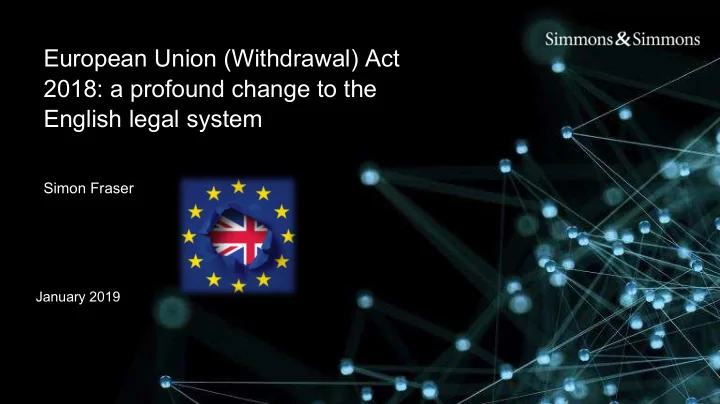

European Union (Withdrawal) Act 2018: a profound change to the English legal system Simon Fraser January 2019
Introduction How do we interpret retained EU law 1
How do we interpret retained EU law? (1) A brief recap on retained EU law EU principles of interpretation remain relevant Section 5(2) EU (W) A 2018 supremacy of EU law continues to apply after exit day to the interpretation (amongst other things) of any enactment or rule of law passed or made before exit day Section 6(3)(a) EU (W) A 2018 any question as to the validity, meaning or effect of any retained EU law is to be decided (so far as unmodified on or after exit day) in accordance with any retained case law and any retained general principles of EU law Conceptual divergence between EU law English law 2
How do we interpret retained EU law? (2) 3
How do we interpret retained EU law? (3) EU courts generally adopt a purposive approach consider not only the words used but also, where appropriate, the context in which they occur and the object of the rules of which they form part De Jaeck v Staatssecretaris Van Financiën [1997] 2 CMLR 799 814 English courts generally adopt a literal approach consider the natural and ordinary meaning of the words used Maunsell v Olins [1975] AC 373, 395 (Lord Simon of Glaisdale) Reasons for divergence are historical (role of judiciary), practical (linguistic) & legal (proportionality) 4
How do we interpret retained EU law? (4) Example of a possible new problem UK statute which contains both domestic & retained EU law (unmodified) Will the conceptual divergence produce different legal outcomes? Unlikely for a number of reasons Gradual convergence between the two approaches Oliver Ashworth (Holdings) Ltd v Ballard (Kent) Ltd [1999] 2 All ER 791, 805 (Kay LJ) the literal tradition is weakening Mykoliw v Botterill [2010] CSOH 84, para. 28 (Lord Pentland) cites with approval an English law text on interpretation argument about literal and purposive interpretations “now probably wholly futile” 5
How do we interpret retained EU law? (5) English courts may depart from literal interpretation if it would lead to objectionable or undesirable result R (Edison First Power Ltd) v CVO [2003] 4 All ER 209 it would lead to the court neglecting the purpose of Parliament R (Quintavalle) v Secretary of State for Health [2003] 2 AC 687 it would put the UK in breach of its (EEC) treaty obligations Pickstone v Freemans PLC [1989] 1 AC 66 Principles of EU interpretation only apply to retained EU law (unmodified) Practical conclusions remember conceptual differences be alert to additional qualifications in advice or opinions 6
Appendix •European Union (Withdrawal) Act 2018 •Act •Explanatory Notes •EU/UK Withdrawal Agreement •Withdrawal Agreement (25 November 2018) •Explainer Note •Future UK/EU Relationship •Political Declaration (25 November 2018) •Explainer note •UK Government slides on Withdrawal Agreement and Political Declaration •EU (Withdrawal Agreement) Bill •24 July 2018 White Paper • The Brexit Deal Explained 7
elexica.com/brexit elexica.com/en/blog/breaking-down-brexit elexica.com/en/resources/microsite/disputes-aviator simmons-simmons.com elexica.com LIVE_EMEA1: 41738549
Recommend
More recommend